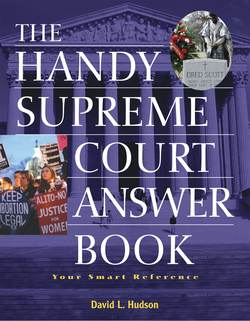Читать книгу The Handy Supreme Court Answer Book - David L Hudson - Страница 46
На сайте Литреса книга снята с продажи.
What is the confirmation process?
ОглавлениеAfter the president nominates a candidate to the U.S. Supreme Court, the U.S. Senate either confirms or denies the nominee. The Senate Judiciary Committee gathers extensive information about the nominee, holds hearings, and eventually votes on whether to move the candidate on for a full Senate vote. The confirmation process can be quite difficult and lengthy depending on how controversial the candidate is deemed to be by Congress, their constituents, and interested public interest groups. It only takes a majority vote for a candidate to win confirmation. However, twenty-six nominations by presidents have not been successful. The Senate rejected twelve appointments to the Court. Those twelve, and the Senate’s rejection vote tally, were:
Prior Judicial Experience of the Current Justices
Chief Justice John Roberts Jr.: U.S. Court of Appeals for the District of Columbia, 2003–5
Justice Samuel Alito Jr.: U.S. Court of Appeals for the Third Circuit, 1990–2005
Justice Stephen Breyer: U.S. Court of Appeals for the First Circuit, 1980–94 Justice Ruth Bader Ginsburg: U.S. Court of Appeals for the D.C. Circuit, 1980–93
Justice Anthony Kennedy: U.S. Court of Appeals for the Ninth Circuit, 1975–87 Justice Antonin Scalia: U.S. Court of Appeals for the D.C. Circuit, 1982–86 Justice David Souter: Superior Court of New Hampshire, 1978–83; Supreme Court of New Hampshire, 1983–90; U.S. Court of Appeals for the First Circuit, 1990
Justice John Paul Stevens: U.S. Court of Appeals for the Seventh Circuit, 1970–75
Justice Clarence Thomas: U.S. Court of Appeals for the D.C. Circuit, 1990–91
John Rutledge (1795): rejected 14–10 (as chief justice)
Alexander Wolcott (1811): rejected 24–9
John C. Spencer (1843): rejected 26–21
George W. Woodward (1845): rejected 29–20
Jeremiah Black (1860): rejected 26–25
Ebenezer R. Hoar (1870): rejected 33–24
William B. Hornblower (1893): rejected 30–24
Wheeler Peckham (1894): rejected 41–32
John J. Parker (1930): rejected 41–39
Clement F. Haynesworth Jr. (1969): rejected 55–45
G. Harrold Carswell (1970): rejected 51–45
Robert Bork (1987): rejected 58–42
